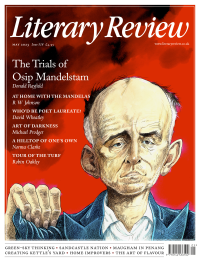Tanya Harrod
Gaudier-Brzeska for the Masses
Ways of Life: Jim Ede and the Kettle’s Yard Artists
By Laura Freeman
Jonathan Cape 400pp £30
Laura Freeman’s book opens with a fictional account of an undergraduate visiting Kettle’s Yard for the first time. It chimes with all the stories of going there I have heard from Cambridge students of a certain age. Between 1958 and 1973, its creator, Jim Ede, offered an informal artistic induction to his young visitors, in effect teaching them how to live with modern painting and sculpture. Kettle’s Yard gave the lie to the belief that the avant-garde could never be twinned with the domestic, that great art had no place in the home. With luck you stayed for tea, meeting Ede’s Scottish wife, Helen, more down to earth than her husband. Cycling back with a Ben Nicholson in your handlebar basket, on loan for a term and to be kept out of the sun, was the cherry on the cake.
It is difficult to find anyone critical of Ede’s project, now under the stewardship of Cambridge University. A rare case was the acerbic commentator on design and architecture Peter Dormer, who died in 1996. He had grown up on a deprived council estate in north Cambridgeshire and at first had loved ‘oh-so-beautiful’ Kettle’s Yard. But he later turned against it with a vengeance, writing angrily in 1986, ‘I believe that the “spirituality” of Kettle’s Yard with its tasteful piles of pebbles on polished oak side tables, its discreet ceramic bowls and bits of sculptural bric-a-brac and Alfred Wallis paintings, rings false.’ Dormer disliked the ‘over-conscious domestic aesthetic’, seeing it as part of ‘an embarrassing and deeply moralising and familiarly English landscape’. Kettle’s Yard reminded him of Snape Maltings, of smug performers of early music and of privileged characters in Iris Murdoch novels.
Ede, who by the time of Dormer’s Lucky Jim-esque outburst had left Kettle’s Yard to the care of professional curators, might have been surprised by his anger and by the suggestion of privilege. Born in Wales in 1895, the son of a teacher and a solicitor, Ede was

Sign Up to our newsletter
Receive free articles, highlights from the archive, news, details of prizes, and much more.@Lit_Review
Follow Literary Review on Twitter
Twitter Feed
Under its longest-serving editor, Graydon Carter, Vanity Fair was that rare thing – a New York society magazine that published serious journalism.
@PeterPeteryork looks at what Carter got right.
Peter York - Deluxe Editions
Peter York: Deluxe Editions - When the Going Was Good: An Editor’s Adventures During the Last Golden Age of Magazines by Graydon Carter
literaryreview.co.uk
Henry James returned to America in 1904 with three objectives: to see his brother William, to deliver a series of lectures on Balzac, and to gather material for a pair of books about modern America.
Peter Rose follows James out west.
Peter Rose - The Restless Analyst
Peter Rose: The Restless Analyst - Henry James Comes Home: Rediscovering America in the Gilded Age by Peter Brooks...
literaryreview.co.uk
Vladimir Putin served his apprenticeship in the KGB toward the end of the Cold War, a period during which Western societies were infiltrated by so-called 'illegals'.
Piers Brendon examines how the culture of Soviet spycraft shaped his thinking.
Piers Brendon - Tinker, Tailor, Sleeper, Troll
Piers Brendon: Tinker, Tailor, Sleeper, Troll - The Illegals: Russia’s Most Audacious Spies and the Plot to Infiltrate the West by Shaun Walker
literaryreview.co.uk